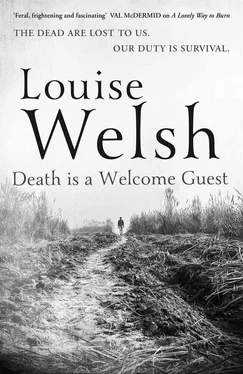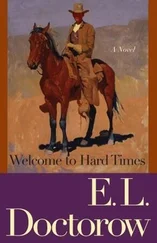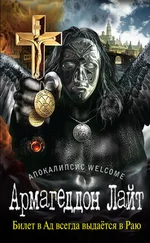Louise Welsh
Death is a Welcome Guest
. . darkness shades me,
On thy bosom let me rest,
More I would, but death invades me;
Death is now a welcome guest.
‘Dido’s Lament’ from Dido and Aeneas, libretto, Nahum Tate
On the second day
The radios failed; we turned the knobs; no answer.
On the third day a warship passed us, heading north,
Dead bodies piled on the deck. On the sixth day
A plane plunged over us into the sea. Thereafter
Nothing. The radios dumb. .
‘The Horses’, Edwin Muir
The Oleander left Southampton on 24 May under the command of Captain Richard Greene for a fourteen-day Mediterranean cruise. The liner had a crew of 1,150 and a passenger list of 2,300 souls. Many of the crew would be engaged in the essential business of sailing the ship, rather than catering to passengers’ whims, but the cruise was advertised as luxurious and the Oleander ’s brochures made a feature of the ratio of one crew member to every two passengers.
The first casualties appeared on day three, not far from Monte Carlo. Travel is well known for broadening the mind and upsetting the tummy, but many of the Oleander ’s guests were elderly and so Captain Greene radioed ahead to let the harbourmaster know that there was a possibility of unplanned disembarkations.
The weather in the Mediterranean was bright and warm, the seas calm. Over the next two days more passengers and crew were confined to their cabins with vomiting, diarrhoea and worrying respiratory complaints. The sick people huddled in bed in their air-conditioned cabins, soaking their sheets with sweat and all the time shivering like it was winter in Alaska.
The first death was unexpected and was followed rapidly by another. Captain Greene radioed the news to the authorities and his boss at the shipping company. He was dismayed to receive the same command from both. The Oleander was to drop anchor immediately and await further instruction. He was equally dismayed to find that he was fighting the urge to throw up, and when the message came that the ship should on no account, repeat, no account, approach port , he was hunched over the ship’s barrier vomiting into blue Mediterranean waters.
Perhaps it was the close confinement of the passengers and crew that allowed the virus to spread so swiftly. Or maybe it was the delay in getting extra medics to the ship, caused by onshore outbreaks of what was soon to be called the sweats. When a launch carrying medical personnel dressed in protective suits eventually arrived, there were fewer than fifty passengers still alive. Most of them were already showing signs of infection. Some determined souls had staged their own evacuation and lifeboats manned by the dead and dying drifted in the waters around the liner. Later some would wash up on pleasure beaches, but by then no one would care.
It was not the first outbreak of the sweats, but it was one of the earliest and it made headlines around the world. Magnus McFall imagined the Oleander often in the months ahead. The giant liner becalmed on sunny waters, looking from a distance like a picture postcard of luxury; the rescue launch hurtling towards it throwing plumes of white foam in its wake; the stench of decay awaiting the medics in the lower decks; the impossibility of salvation.
London was hotter than Mumbai that summer, hotter than Beirut, hotter than hell, or so people said. Magnus McFall believed them. The train’s windows were open, but the air blasting through the carriage had a nasty, second-hand quality that reminded Magnus of sliding into a recently vacated bath, warm water scummed with soap. It did not help that the passengers were rammed together as if it were the last train out of Saigon. He breathed in through his mouth and tasted burning rubber. Some summers the tracks melted, stranding passengers between stations. It would screw him, but the possibility brought a smile to Magnus’s face. He thought he might talk a wavering suicide bomber into sticking to his plan — paradise is worth dying for, son, pull that string and shame the infidel — if it meant the show would not go on, even though the show was the only thing that really mattered.
Magnus caught a girl glancing at him from across the aisle and grinned again. The girl frowned and looked away and Magnus wondered if he should practise smiling without showing his teeth. His agent, Richie Banks, had advised him not to get them fixed: ‘They’re as crooked as a pyramid sales scheme, but they’re your best feature, chum. Make you look a bit less like your mother left you out in the rain.’ Judging by the photographs lining his office walls, Richie had represented some odd-looking comics in his time. Magnus was not sure his agent knew the difference between a funny man and a funny-looking man.
Magnus glanced at his watch. Ninety minutes to go. He took a tissue from the pocket of his jeans and dabbed the sweat from his forehead, surprised by how calm he felt. It was the dead calm of the soldier about to go over the top, or an armed robber readying to storm a bank, but it was better than the gut-twisting that could cripple him before a show.
He looked down the carriage. Most of the passengers were also bound for O2. The crush of teenage girls in baseball caps stamped Johnny Dongo Done Done Me Wrongo was obvious. So was the group of middle-aged women, co-workers in some office, he guessed, large bosoms quivering with the motion of the train, bags clink-full of bottles that would be confiscated at the stadium entrance. There were couples too, the women better dressed than a night in the dark warranted in deference to the high ticket price; the men smart-casual in best jeans and trainers. They were out for a good time and that meant they would give him a chance. The Johnny Dongo look-alikes, Dongolites, were a different story. There were four of them smart-arsing by the door, dressed like 1930s history dons on their way to enlist for the wrong side, their floppy hair plastered with sweat and styling gel. They would be impatient for Magnus’s set to end and for Johnny to take the stage. Magnus wondered how they could stand the combination of tight collar and tie, the tweed suits heavy with perspiration. One of the Dongolites took out a Meerschaum pipe and stuck it between his teeth.
Magnus’s own stage gear was zipped inside a garment bag slung over his shoulder, a white shirt and gangster-sharp, midnight-blue suit that looked like a safe choice until you caught a glimpse of scarlet lining. His guts were beginning to clench. He looked out of the window, trying to keep his eyes on the horizon, the way you were meant to on a rocky ferry crossing the Pentland Firth. London blurred by, a strip of blue sky above rows of apartments, precipitous graffiti and concreted back yards cast in shade. It was a world away from Orkney, but the tall buildings reminded him of Stromness, the shadows thrown by the houses along the seafront on to the jetties lined before them. The memory made Magnus think of school and all of a sudden he wished Mr Brown, his maths teacher, was going to be in the audience. ‘You see, Mr Brown,’ he would say, ‘folk do find me funny. It turns out that I am a funny guy after all.’ But Mr Brown was as dead as Magnus’s father, both of them buried in the Kirkwall churchyard. The maths teacher felled by a heart attack he had cultivated as carefully as an investment banker might nurture his own pension, Magnus’s father killed in a careless accident. Bad luck, everyone agreed, especially as Big Magnus never even took a Hogmanay dram.
Читать дальше












